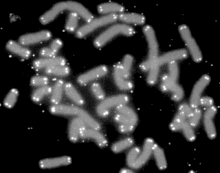telomere
See also: télomère
English

Human chromosomes (grey) capped by telomeres (white)
Etymology
Derived from Ancient Greek τέλος (télos, “end, extremity”) + Ancient Greek μέρος (méros, “part”).
Pronunciation
IPA(key): /ˈteləmɪəɹ/, /ˈtiːləʊmɪəɹ/, /ˈtɪləmɪəɹ/
Noun
telomere (plural telomeres)
- (genetics) Either of the sequences of DNA at each end of a eukaryotic chromosome.
- 2004, Peter M. Lansdorp, 11: Telomeres and Telomere Regulation, Robert Paul Lanza (editor), Handbook of Stem Cells, Volume 2: Adult and Fetal Stem Cells, page 127,
- Chromosome ends or telomeres are composed of guanine-rich repeat sequences and associated proteins. A minimum number of repeats is essential for proper telomere function and to avoid sustained activation of DNA damage pathways that may result in replicative senescence or cell death.
- 2004, Peter M. Lansdorp, 11: Telomeres and Telomere Regulation, Robert Paul Lanza (editor), Handbook of Stem Cells, Volume 2: Adult and Fetal Stem Cells, page 127,
Related terms
Translations
either of the sequences of DNA at each end of a eukaryotic chromosome
This article is issued from Wiktionary. The text is licensed under Creative Commons - Attribution - Sharealike. Additional terms may apply for the media files.